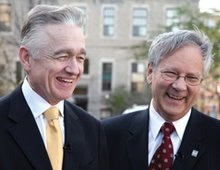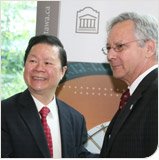
June 26, 2009
..
Nathalie Des Rosiers
VP-Governance
University of Ottawa
..
..
Re: Policy 92 disclosure of wrongdoing, university’s surveillance of professor..
..
Dear Nathalie Des Rosiers,
..
University Policy 92 states that the VP-Governance, your office, will thoroughly investigate all allegations of wrongdoing. In this policy, “wrongdoing” means any act that is “dishonest, inappropriate or illegal.”
..
I hereby report wrongdoing by
VP-Academic Robert Major. Other University officers and staff are also involved. Paragraph-16 of Policy 92 foresees that the written report of your investigation will be provided to the Board of Governors.
..
..
WRONGDOING..
VP-Academic Robert Major and other University officers and staff practiced surveillance of two of my invited talks at other academic institutions in 2007 and 2008, while I was a full and tenured professor at the University of Ottawa. A description of evidence is given below.
..
As the officer responsible for Policy 92 investigations, you will recognise that such covert surveillance by the university is contrary to the “the highest standards of honesty, integrity and transparency in all of [the university’s] activities.”
..
As the designated General Counsel for the Canadian Civil Liberties Association (CCLA), you will recognize that such surveillance by a corporation of one of its employees is contrary to responsible behaviour in a free and democratic society.
..
As an academic, you will recognize that such behaviour by a university is a violation of the legally established principle of academic freedom.
..
As a lawyer, you will recognize that this type of personal information gathering and use is against the law. Specifically, it is against the Freedom of Information and Protection of Privacy Act (FIPPA) of Ontario to which universities in Ontario are bound and against the Employment Standards Act of Ontario.
..
..
ADDITIONAL WRONGDOING..
In addition to the surveillance itself, there has been an attempt by VP-Academic Major and other officers of the University to avoid the issue. The VP-Academic and the University have not acknowledged my direct enquiries of October 16, 2008 (with the President, Secretary, and APUO in cc), and December 9, 2008 (with the President, Dean of the Faculty of Science, the APUO, the Head of Human Resources, and yourself in cc) in this matter.
..
..
EVIDENCE..
Using Freedom of Information and Protection of Privacy Act (FIPPA) requests, such as my request dated August 7, 2008, I have established that the University, via Mr. Major and other offices, has used the services of a private reporter to monitor an invited academic talk I gave at the Studies in National and International Development (SNID) group at Queen’s University, some 200 km from Ottawa, on October 18, 2007.
..
The respondent FIPPA records are unambiguous regarding the act of surveillance of me.
..
The University used a private reporter a second time to monitor my invited contribution at the Association Canadienne Française pour L’Avancement des Sciences (ACFAS) conference in Quebec City, some 450 km from Ottawa, on May 7, 2008. See my FIPPA request dated May 8, 2009 (addressed to you) and the related Appeal to the Information and Privacy Commissioner (IPC) dated June 10, 2009.
..
You have my permission to use the relevant FIPPA records respondent to my FIPPA requests and my requests in your investigation. These records are available in the office of the University’s FIPPA Coordinator.
..
..
NEED TO PRESERVE EVIDENCE..
According to my FIPPA inquiries, in the past, the email records of leaving university officials (e.g. VP David Mitchell) have not been preserved. Since VP-Academic Major is leaving the University at the end of the month and since your investigation may take some time, I ask that all of Dr. Major’s records relevant to this matter be preserved.
..
Please acknowledge receipt of the present disclosure of wrongdoing. Please confirm that your office will investigate.
..
..
Sincerely,
Denis Rancourt
..
Cc: Marc Jolicoeur, Allan Rock, Robert Major, Andre E. Lalonde, Louise Page-Valin, APUO, CAUT, CUPE 2626, SFUO, GSAED, CCLA, made public.
..
RELATED POST:
1984 coming to a campus near you..
[photo credit: University of Ottawa; VP-Academic Robert Major]




















